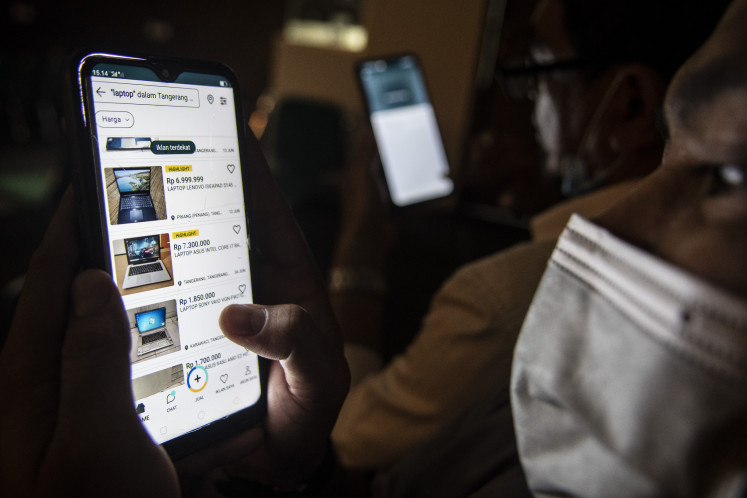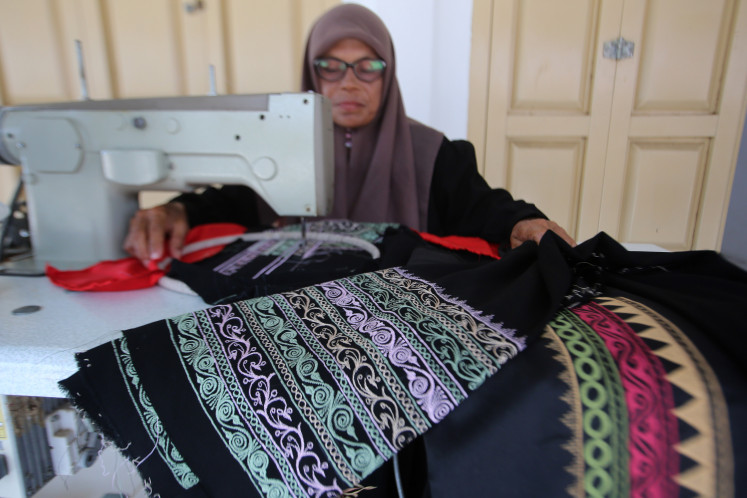Popular Reads
Top Results
Can't find what you're looking for?
View all search resultsPopular Reads
Top Results
Can't find what you're looking for?
View all search resultsDon’t neglect our pilgrims
The government cannot remain silent when citizens are facing hardships in their bid to fulfil their religious obligation.
Change text size
Gift Premium Articles
to Anyone
T
he nation has been shocked by the tragic death of an Indonesian man from dehydration while reportedly attempting to illegally reenter Mecca for the haj. The man, a university lecturer from Pamekasan, Madura, East Java, was initially denied entry for not having the proper visa.
He was part of a group of 10 Indonesians stopped by Saudi authorities for not having haj visas. Despite the warning, he and two others tried to return to Mecca through the Jumum desert. His body was discovered on May 27, while the other two survived and received medical treatment.
While deaths during the physically demanding haj are not unheard of, this tragedy was preventable. For many Indonesians, the haj is a once-in-a-lifetime journey that often follows years, even decades on a waiting list due to Saudi Arabia's quota system. Currently, about 5.6 million people are on this list, including over 600,000 elderly individuals, most registered for the government-subsidized regular haj plan.
The long wait can breed desperation, prompting some who can afford it to attempt the pilgrimage without a permit. They risk not only arrest and deportation but also the dangers of the scorching desert, as this recent death highlights. This comes as Saudi authorities intensify crackdowns on unregistered pilgrims attempting to sneak into Mecca.
This year, approximately 203,000 Indonesian pilgrims are in Saudi Arabia, joining over 1.4 million others from around the world.
Adding to the complexities, about 1,000 other Indonesians were unable to depart for the haj because Saudi Arabia did not issue their furoda visas. These special visas are granted directly by the Saudi government, allowing recipients to bypass the long queues. But they come at a significant cost, reportedly ranging from Rp 270 million (US$16,531) to Rp 1 billion.
Deputy chair of the Haj Organizing Agency (BP Haji), Dahnil Anzar Simanjuntak had confirmed the Saudi Arabian government would not issue furoda visas this year in the first place, a departure from previous years, as part of the kingdom’s efforts to improve the organization of the pilgrimage.
This incident has resulted in substantial financial losses for both pilgrims and travel providers. Even though the furoda haj arrangements are a matter between travel agencies and Saudi authorities, the government must take a position to help resolve the controversy. At least the state has to ensure the legal protection of the pilgrims.
In response to public outcry, Foreign Minister Sugiono and Religious Affairs Minister Nasaruddin Umar stated the visa issue rests with the Saudi government, which has sole authority. Nasaruddin added that he had tried to help communicate the issue with the Saudi authorities.
For decades, the government has worked to improve the organization of the world's largest haj contingent, focusing on flights, costs and lodging. Yet, persistent problems remain, such as reports this year of family members being housed in separate accommodations.
The visa complications and illegal pilgrimage attempts serve as a stark lesson for the BP Haji. Established recently by President Prabowo Subianto, the agency is set to take full responsibility for haj management from the Religious Affairs Ministry next year.
As the House of Representatives revises the 2019 haj law to facilitate this transition, some lawmakers have even proposed elevating the agency to a full ministry.
The pilgrimage culminated in its most sacred stage on Friday, beginning with the wukuf (a prayerful stand) at Arafah. This was followed by the mabit, an overnight stay in Muzdalifah, before pilgrims proceeded to Mina to perform the jumrah, the symbolic stoning of the devil.
Next year, the same rituals will repeat, but mistakes in the haj administration must not. The government cannot remain silent when citizens are facing hardships in their bid to fulfil their religious obligation.
The pilgrims are entitled to protection and the government has to provide it.











